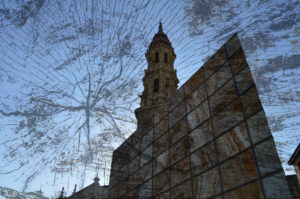DISEQUILIBRIUMS. The Individuals. Chapter 22
CHAPTER 22
Thursday 22 December 2016
Time: 3:00 pm
“I’ve already told you that we would be arriving in 15 minutes…”
The words of the taxi driver rouse me from my thoughts as he takes me home.
“…It’s always the same. Fifteen minutes. The traffic lights on this route are well-synchronised and there are normally no problems. If there are works or a traffic jam, they immediately make an alternative route available. So it’s always 15 minutes from the place I pick you up to the area where you live.”
I wasn’t listening to him at first, but what he said just now made me remember what we’ve been talking about these days with regard to the city – the famous balance. Would Emperor Augustus be aware of what he had achieved? A city that is continually modifying itself or adapting to re-establish balance if something has been altered. ‘A city in constant search for balance’, the city’s promotional slogan, comes to mind. “Why has this never occurred to anyone else before?” This was the last thing Elsa said to me. It left me intrigued because she wasn’t able to finish the story as a result of my brother’s call.
“But lately, we have to recognise that there are more traffic jams…” The taxi driver commented again.
When I said goodbye to Elsa, I checked to see if I had some money with me, and without a second thought, I stretched out my hand in the street to stop a taxi. I wanted to reach home as soon as possible. I believe that he must have felt sorry for me. Because of how nervous I was when I got into his taxi, he’s not stopped speaking in order to help me calm down.
“…People have been fainting in their cars. Fortunately, until now, it’s happened mainly when they were standing at the traffic lights. The problem is that it’s causing quite a lot of alarm in case it happens while they are driving.” The taxi driver concluded just as we stopped in front of my building.
I am afraid. I don’t know what I’m going to find at home. My mother unable to regain her balance just like the other people collapsing in the city? Until now, I thought that it could only happen to others, but not to any of the five of us.
I get out of the taxi and run to the front door. I can’t find my keys. I put them in the outer pocket of my backpack, but they are not there. Or perhaps I put them inside? I don’t know. I can’t remember. I am beginning to get nervous because they’re not inside either. I look inside the hall to see if a neighbour has come down and can open the door for me. No one is there. Finally, without thinking about it, I put my hand in my trousers’ pocket and feel the bunch of keys which I had put into my pocket when I rushed out of the apartment this morning. I manage to open the door. Just at that moment, one of the neighbours comes out of the lift and greets me. There’s no time to return the greeting because I immediately run up the stairs. It’s only three floors, but I wouldn’t know what to do, alone in the lift in the time it takes to arrive at our floor. I’d go crazy and I prefer to avoid that.
Marco has already put our mother on her bed. He’s calm. He tells me what has happened.
Apparently, she had fainted while she was working at the computer in her office. My brother was studying in his room when he heard the thud. He called her, but she didn’t answer. So he got up and went to find her. He found her with her head on the computer. He saw that she had a cut on her forehead and that it was bleeding. Carefully, he picked her up and put her on her bed. Then, he went for the medical kit, and with a sterile gauze and some hydrogen peroxide, he cleaned the wound. Afterwards, he called me.
This room has always given me a feeling of loneliness. Since our father’s death, I remember that this room has always been tidy: the bed perfectly made with this pink bedspread with white flowers; the white wooden bedside table with a small lamp on top for reading; the alarm clock and a pile of books on the only shelf below. The white colour of the walls is only interrupted by the window, with the mirror above the dressing table for applying make-up and the large picture on the wall behind the bed. My mother likes the sea, as do my brother and I. A couple of years ago, we gave her this beautiful sunset over the Pacific so that the sadness she felt in this room would disappear because, here, she was filled with loneliness and nostalgia.
When our father died, she changed her room for this smaller one and gave us the large one. The apartment has only two bedrooms. Although I like it, I don’t normally like talking about it with my friends because I think they live in larger homes. My mother spends much of her time here. She hardly ever goes to the living room. Her route around the house goes from the kitchen, our room, the bathroom and then back to her room. I don’t know why she doesn’t like sitting in the armchair, at least to watch a film with us. It’s difficult to get into the mind of someone, especially hers.
The dressing table is at the foot of the bed. It’s a small table, also in white, full of cosmetics. It’s perhaps the only corner of the room where there isn’t a lot of order because my mum spends a lot of time sitting there. She’s always well made-up, even within the house. Sometimes, I think that she is obsessive, although I have to admit that she does it with elegance and class, but I’ve never said that to her.
Next to the dressing table and the window is the area she calls her office, which is nothing more than a table, a chair and a three-drawer cabinet on casters. I can imagine her bent over with her head on the laptop she uses, with her body illuminated by the bright sunlight entering through the curtainless window, the scene that would have confronted Marco.
Now she is on the bed.
I don’t know if any boy of 14 would have reacted as my brother did. What I do know is that we two boys have been brought up alone with my mother. From what I can see in the rest of my class mates, when one of their parents has suddenly gone and the other has to take charge of everything, life takes a different turn for the children. It’s difficult to explain why. I’ve seen many cases among people I know when you try to see how they get on with other young people of your own age. In our case, someone might say that we’ve become somewhat cold and hard. Often, it’s difficult to interact with others in a group when we prefer to do things on our own. It’s not that we’re poorly behaved. It is just that we are accustomed to making decisions for ourselves. This would have made my brother react quickly because if my mother had remained in the position she was in for a long time, the wound might have developed complications and she could even have drowned by losing consciousness as a result of the blow.
Since the cases of people fainting started, the Town Hall has organised a support service for people suffering this problem in the street and there is also a consultation service for all family and friends who have to help someone. Our mother talked about it with us only last night and explained the advice that was given if it occurred within the home. The first was to check to see if the person who lost his balance is injured and to deal with it immediately, then move him, make the area safe and finally put him to bed. The support services also request that they be informed by telephone of how it happened, with name and surnames so that the details of sufferers could be entered into a register. They have to know how many people there are to be ‘cured’ when a way is found to do so, and no one can be excluded from the actions to be carried out.
“And now, what do we do?” He asks as he looks at me.
He had already called the Town Hall service to include our mother’s name in the register. It is here that I feel the responsibility of being the older brother. We are accustomed to making decisions, after weighing up all the alternatives with time, but this is different. When we had questions about anything, we would seek the advice of our mother, and although she did not tell us what to do, she showed us another option that we had not yet considered. Then, she left us to make our own decision. But today, she is not conscious to help us to make the next move.
“She already told us that if this happened,” I replied seriously and firmly at the same time. “We would have to call Uncle Daniel and go with him.”
Uncle Daniel is the only brother of my mother. He also lives in the city, and the truth is that we got on very well with our three cousins. I know that just the thought of calling my uncle will please Marco. He’s a very purposeful man. I am sure that he will help us.
Precisely for this reason, when I call him to explain what had happened, I am not surprised he responded immediately, without complaint, and tried to be optimistic.
“Don’t worry about anything, David,” he tells me on the telephone. “I am coming to meet the three of you now and you will stay with us until this is all resolved.
“Thanks, Uncle. Thank you very much,” I answer. “Please take my mum and my brother. I have something very important to do.”
At that moment, I hear a signal on my mobile indicating I have a new message. I read it while I am still on the line to my uncle. “Meet me in half an hour at the Church of La Magdalena.” Sofia has sent it.
Support the project and buy the book:
Writer: Glen Lapson © 2016
English translator: Rose Cartledge
Publisher: Fundacion ECUUP
Project: Disequilibriums
Register on the website www.disequilibriums.com/en/registred and you will receive a notification to allow you to read the chapters as they are published and updates of the project.



No Comments